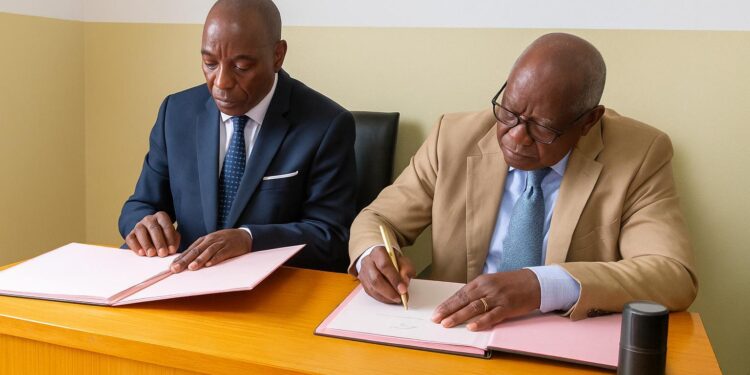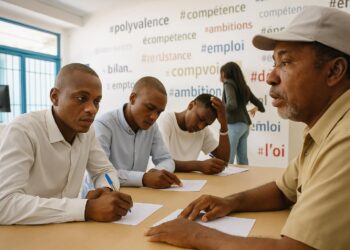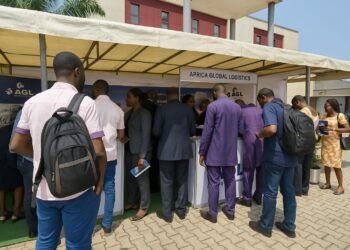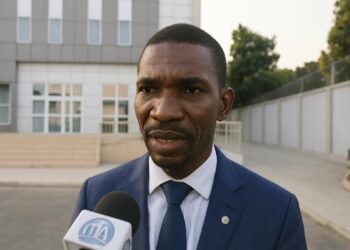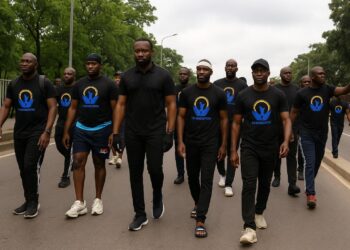Historic Academic-Media Pact in Brazzaville
The conference room of Brazzaville’s La Nouvelle République headquarters carried an unmistakable air of purpose on 22 August 2025. Executives from the national press group and the Institut Supérieur Polytechnique-Université gathered to sign a long-term cooperation accord designed to deepen professional skills across newsrooms and classrooms alike throughout the country.
Under the attentive gaze of colleagues, Director General Anasth Wilfrid Mbossa and his counterpart, Director General Eric Makaya Goma, placed their signatures on an open-ended pact. The document formalises a strategic alliance that merges academic rigor with the editorial discipline expected inside a major Congolese media institution serving national and regional audiences.
Bridging Theory and Newsroom Practice
At its heart, the partnership seeks to close the longstanding gap between theoretical instruction and newsroom realities. Diplomats monitoring capacity-building efforts in the Central African sub-region often highlight such public-private cooperation as a multiplier of talent, credibility and innovation within information ecosystems critical to governance and social cohesion.
The indefinite duration clause signals intent to embed cooperation in institutional DNA rather than in short project cycles. By granting flexibility, both entities anticipate future curricular updates, technology shifts and editorial reforms that could require rapid recalibration yet still rest on the same foundational memorandum of understanding today.
Internship Pipeline for Emerging Journalists
Every two months, graduating ISP-U students will occupy rotational, unpaid internships inside La Nouvelle République’s desks. Editors commit to exposing them to reporting routines, fact-checking, multimedia production and ethical guidelines—an immersion considered indispensable before young graduates attempt competitive entrance into Congo-Brazzaville’s dynamic labour market and gain accredited professional portfolio pieces.
For many students, securing any placement has grown increasingly difficult amid global economic headwinds. Eric Makaya Goma acknowledged the hurdle, noting that the accord offers an immediate, structured route into practice. His remark underscores an emerging consensus that experiential learning remains a cornerstone of employability regardless of sector or geography.
Mutual Visibility and Cost-Free Benefits
La Nouvelle République will also publish ISP-U’s end-of-year results and institutional notices without charging advertising fees. In a media environment where column inches equate to budgets, the gesture effectively amplifies the university’s visibility, reinforcing transparency around academic outcomes while conserving resources for laboratory upgrades and research projects in Brazzaville campus.
Reciprocity remains central. Every academic year, ISP-U will admit four newsroom employees into continuing-education tracks or tailored short courses. La Nouvelle République retains authority to nominate participants and select modules, ensuring training responds directly to editorial imperatives such as data journalism, digital security or constructive interviewing techniques as needs evolve.
Financial accessibility forms another pillar. The agreement explicitly waives registration and tuition fees for the selected journalists, thereby lowering barriers to lifelong learning. In turn, the university benefits from practitioners’ field insights, which can inform syllabi and keep instruction aligned with newsroom realities rapidly transforming worldwide today too.
Joint Oversight Ensures Quality Training
A co-supervision mechanism has been crafted to safeguard academic integrity and professional relevance. Faculty mentors and section editors will jointly monitor progress through assessment grids, feedback sessions and portfolio reviews, creating a bidirectional feedback loop that minimises skill mismatch and encourages iterative refinement of both curricula and workflows.
Speaking after the ceremony, Anasth Wilfrid Mbossa framed the initiative as part of a broader performance culture permeating public entities. ‘Continuous training is no longer optional; it is vital to the quality of service citizens expect,’ he observed, emphasising the accord’s contribution to efficiency benchmarks already in force nationwide today.
Eric Makaya Goma echoed the sentiment from an academic vantage point. ‘Our graduates will confront exacting standards outside campus gates. This partnership offers them a rehearsal stage where mistakes become lessons rather than liabilities,’ he stated. Observers noted the remarks reflect converging interests between higher education and information industries nationwide.
Implications for Congo’s Knowledge Economy
The accord aligns neatly with Congo-Brazzaville’s ongoing efforts to nurture a knowledge-driven economy capable of diversifying revenue streams. While the agreement is principally bilateral, its underlying model could inform future frameworks linking universities, state agencies and private enterprises interested in synchronising talent pipelines with sectoral demands across industries.
Media analysts add that newsroom professionalism forms a cornerstone of credible public discourse. By equipping staff with updated analytical tools, La Nouvelle République enhances its ability to deliver fact-based coverage that supports constructive policy debate, investment confidence and social cohesion—objectives broadly embraced by governance and development partners in the region.
Both institutions describe the contract as living, not static. Regular evaluation meetings will examine internship outcomes, course relevance and technological upgrades, allowing for amendments without renegotiating core principles. Such adaptability reflects an awareness that media platforms and pedagogical techniques can evolve faster than conventional bureaucratic cycles of approval.
As signatures dried, the message delivered to onlookers was unmistakable: strategic cooperation, when rooted in mutual benefit, extends beyond ceremonial photographs. For Congo-Brazzaville, fostering bridges between lecture halls and editorial floors represents an incremental yet durable step toward a resilient information sector positioned to serve both state and society.

































